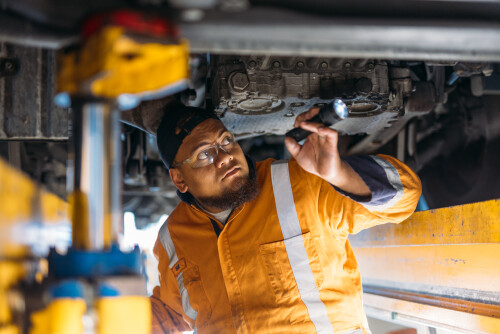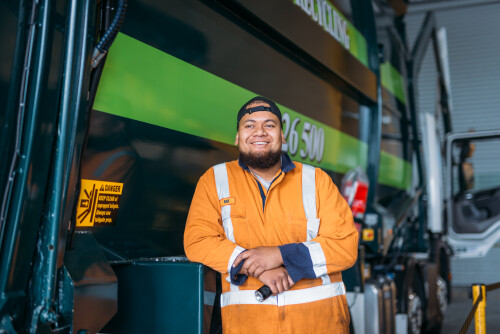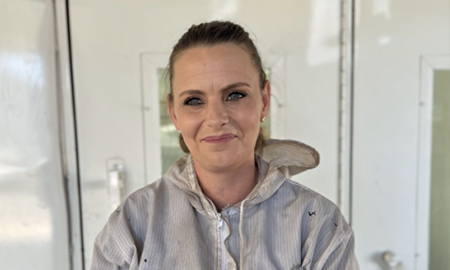Sui's Set to Qualify as a Heavy Hitter in Heavy Automotive
From toying with car sound systems to managing heavy vehicle workshops, Sui’s story shows how qualifications can open doors. His journey proves that with perseverance and purpose Māori and Pasifika tradies can build successful careers. Sui’s roots in Tonga and the Cook Islands, combined with his Auckland upbringing, have shaped his path in the automotive industry.
From tinkering to trucks

Sui’s family traces their roots to the Fatai and Kolovai villages of Hihifo in Tonga and Aitutaki in the Cook Islands. Mesuilame Vea-Williams grew up in South Auckland with his sister Alilia and two elder brothers, Isikeli & Kapelieli. His elder brother is the reason for working with cars, but unfortunately, both brothers have passed away.
"I never planned to work on trucks. Instead, I began working on sound systems in the boys’ cars. My older brother Kapelieli was the mastermind and my teacher then. I was ordered to do whatever he said when we were working on the cars, and, as little brothers do, I did exactly that.
“I enjoyed what I was doing and began to gain an understanding of how things worked. It sparked my interest in mechanics, especially cars, so I started pre-trades at MIT, studying light automotive with the support of MPTT.”
A chance job during a Christmas break in 2017 led Sui to try working with heavy vehicles. “I came across a trades assistant role at Waste Management. Although I knew nothing about trucks, I thought I’d jump in and try it out,” he says. And it was the right move!
“It was a big company and most of their guys are qualified. However, after I’d been there a few months, I asked them about an apprenticeship."
Apprenticeship and beyond
Sui pushed hard to get his break.
“I was constantly asking and bugging them about an apprenticeship, but eventually, they set me up as the first-ever apprentice at Waste Management.”
Since then, Sui took up a new role at JJ Richards in 2018, where then completed his Level 3 and 4 Heavy Automotive qualifications.
Jodi Franklin from MITO, the industry training organisation, explains that the industry expects technicians to be qualified at level 4. This covers the day-to-day service and diagnostic work in a workshop.
Sui says one of the differences with heavy vehicles is safety concerns. “Everything is ten times heavier and bigger, so you must develop good safety work processes.” He feels these will transfer over to other types of mechanics.
Climbing the career ladder
Sui’s hard work has opened doors. One of the highlights was when he took up an opportunity to be workshop manager down in Tauranga and Hamilton in 2021
“That was one of the best things for my career so far. It gave me the tools and experience to run a business.
“Leadership demands more and different skills around an organisation. In particular, I learned that it saves a lot of time if things are well-prepared and well-organised. Planning takes up more of your time as a leader, but it’s crucial.”
The value of qualifications
In 2023, a new Level 5 programme was released, and MITO offered Sui an introductory scholarship. Jodi says, “We have been so pleased to see his progress. I am confident he will complete it shortly and join a small group of individuals who have gained the qualification so far.
 “This will really make Sui stand out from the crowd; it is a challenging programme, and he has made great progress. Gaining this qualification shows the industry that he is at the top of his game.
“This will really make Sui stand out from the crowd; it is a challenging programme, and he has made great progress. Gaining this qualification shows the industry that he is at the top of his game.
“It’s a step up from the other levels; only a small proportion of qualified technicians enrol in Level 5. Gaining the qualification means you can handle complex diagnostic repairs, oversee team responsibilities and ensure compliance with legislative and company requirements. These skills are an asset to any workshop. And, of course, it boosts his earning potential.”
Bright future
Sui has big plans for the future. “In five years, I want to be working for myself. I’m already taking steps towards that with my qualifications and starting up a business as a side hustle.
“It is busy fitting everything in because the qualification means you’re looking at complex jobs in a lot of detail. Eventually, I’d like to go beyond heavy vehicles to include cars and motorcycles.”
Cultural identity and growth
As a young Pacific Islander, Sui faced challenges working outside Auckland and away from his community. “I was hesitant about being there by myself,” he admits. However, it’s important to him to set an example for other Māori and Pasifika youth thinking about trades.
It’s understandable to want to stick to your own people and language, but you can keep your identity while broadening your opportunities. He says the MPTT programme is special in the way it supports this. “Being clear about my purpose, culture, and identity helped me overcome any barriers."
Advice for aspiring mechanics
Suis advice to others is clear: “Chase your dreams. It doesn’t matter what they are — how big or how small — just go for it. And remember that you’ll never hit a home run unless you swing the bat. Always give thanks to those above you on the ladder for their teachings, but never forget those who have yet to follow your path.”
He stresses the value of qualifications:
“Keep chasing qualifications; your qualification is a ticket you have for life, and you can take it anywhere you go.”
As an industry insider, Jodi agrees. “The automotive industry is constantly evolving with new technologies and systems, so technicians are continually learning and upskilling. Level 5 qualifications are available in Light Vehicle, Auto Electrical, Heavy Vehicle, Electric Vehicle, and Collision Repair.
“If you’re interested in the management side, there’s also the NZ Certificate in Business, First Line Management.”
MITO has an annual round of scholarships for Māori, Pasifika, women, and new New Zealanders, and these are open to alumni wanting to look at enrolling into an advanced programme in the New Year. Read more here.
Sui says that being qualified in the industry puts you at a huge advantage.
“There are so many opportunities. Your qualification journey is a gateway to wherever you want to go.”




